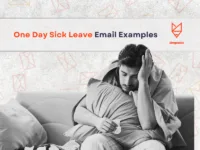Taking medical leave from work can be a challenging experience, both physically and emotionally. Whether you’re dealing with a short-term illness or a more serious health issue, it’s important to communicate your situation to your employer effectively and professionally. Writing a medical leave email is a crucial step in this process.
Understanding Medical Leave
Medical leave is a crucial aspect of employment that allows employees to take time off for health-related issues without the fear of losing their job. Understanding the regulations surrounding medical leave is essential for both employees and employers. This knowledge ensures compliance with labor laws and promotes a supportive work environment.
Key Regulations Surrounding Medical Leave
1. Family and Medical Leave Act (FMLA)
In the United States, the Family and Medical Leave Act (FMLA) is a key regulation that provides eligible employees with the right to take unpaid, job-protected leave for specified family and medical reasons. Under FMLA, employees are entitled to:
- Up to 12 weeks of unpaid leave in a 12-month period for:
- The birth and care of a newborn child.
- The placement of a child for adoption or foster care.
- Caring for an immediate family member (spouse, child, or parent) with a serious health condition.
- The employee’s own serious health condition that makes them unable to perform their job.
- Job Protection: Employees are entitled to return to the same or an equivalent position after their leave.
2. Americans with Disabilities Act (ADA)
The Americans with Disabilities Act (ADA) prohibits discrimination against individuals with disabilities and requires employers to provide reasonable accommodations. This may include medical leave as a form of accommodation for employees with serious health conditions or disabilities.
3. State-Specific Laws
Many states have their own regulations regarding medical leave that may offer additional protections beyond federal laws. For example, some states provide paid family leave or have specific requirements for medical leave notifications. Employers should ensure they are compliant with both federal and state laws.
4. Company Policies
Employers often have their own policies regarding medical leave, which may include details on how to request leave, documentation requirements, and the duration of leave. It’s essential for employees to familiarize themselves with their company’s policies to ensure compliance and smooth processing of their requests.
Understanding medical leave regulations is vital for both employees and employers. By familiarizing yourself with laws such as FMLA and ADA, as well as company-specific policies, you can navigate the process more effectively. If you have further questions about medical leave, consult your HR department or legal counsel to ensure you are informed and compliant. Taking care of your health is important, and understanding your rights regarding medical leave can help you do just that.
Tips for Writing a Medical Leave Email
- Be Clear and Concise: State the purpose of your email right away. Mention that you are requesting medical leave and provide the relevant dates.
- Keep It Professional: Use a formal tone, as this is a professional communication. Avoid overly casual language.
- Provide Necessary Details: While you don’t need to disclose specific medical information, it’s helpful to mention the reason for your leave in a general way (e.g., surgery, recovery from illness).
- Specify Your Availability: If you’re able to, mention whether you’ll be available for any urgent matters during your leave.
- Express Gratitude: Thank your employer for their understanding and support during this time.
- Follow Company Policies: Make sure you are aware of your company’s policies regarding medical leave, including how much notice is required and any documentation needed.
Medical Leave Email Examples
With these tips in mind, here are five well-written examples of medical leave emails:
Example 1: Short-Term Medical Leave
Subject: Request for Medical Leave
Body:
Dear [Manager’s Name],
I am writing to formally request medical leave starting from [start date] to [end date]. Due to a medical condition, I will need this time to focus on my recovery. I appreciate your understanding during this time, and I will ensure that all my responsibilities are managed before my leave begins.
Thank you for your support.
Best regards,
[Your Name]
Example 2: Extended Medical Leave
Subject: Medical Leave Request
Body:
Dear [Manager’s Name],
I hope this message finds you well. I am reaching out to inform you that I will need to take a medical leave of absence starting [start date] and extending until [end date]. My doctor has advised me to take this time off for treatment and recovery.
I will do my best to ensure a smooth transition of my duties before my leave begins. Thank you for your understanding.
Sincerely,
[Your Name]
Example 3: Medical Leave for Surgery
Subject: Medical Leave Notification
Body:
Dear [Manager’s Name],
I am writing to notify you that I will require medical leave for surgery scheduled on [date]. I anticipate being away from work from [start date] to [end date] for recovery. I will keep you updated on my progress and any changes to my expected return date.
Thank you for your understanding and support.
Warm regards,
[Your Name]
Example 4: Mental Health Leave
Subject: Request for Medical Leave
Body:
Dear [Manager’s Name],
I hope you are doing well. I am writing to request a medical leave of absence starting [start date] due to mental health reasons. I plan to return on [end date] and will ensure all my projects are up to date before my leave.
Thank you for your compassion and support during this time.
Best wishes,
[Your Name]
Example 5: Follow-Up on Medical Leave
Subject: Update on Medical Leave
Body:
Dear [Manager’s Name],
I wanted to provide an update regarding my medical leave, which began on [start date]. I am currently following my treatment plan and am making progress. I anticipate returning to work on [expected return date].
Thank you for your ongoing support and understanding.
Sincerely,
[Your Name]
Frequently Asked Questions (FAQs)
1. What qualifies as a serious health condition under FMLA?
A serious health condition typically involves an illness, injury, impairment, or physical or mental condition that requires inpatient care or continuing treatment by a healthcare provider. This can include conditions like chronic illnesses, surgeries, or severe mental health issues.
2. How do I request medical leave?
To request medical leave, you should notify your employer as soon as possible. Follow your company’s procedures for leave requests, which may involve submitting a formal request in writing and providing any necessary documentation from your healthcare provider.
3. Am I entitled to paid medical leave?
Under FMLA, medical leave is generally unpaid. However, some employers may offer paid medical leave as part of their benefits package. Check your company’s policies to understand your entitlements.
4. Can my employer deny my request for medical leave?
Employers can deny medical leave requests if the employee is not eligible under FMLA or if the request does not comply with company policies. However, they cannot deny leave based on discriminatory reasons or retaliation for taking leave.
5. Will taking medical leave affect my job?
Under FMLA, your job is protected, meaning you have the right to return to the same position or an equivalent one after your leave. However, if you are not eligible for FMLA, your job security may depend on your employer’s policies.
6. What happens if I need to extend my medical leave?
If you need to extend your medical leave, you should notify your employer as soon as possible. This may require additional documentation from your healthcare provider and should adhere to your company’s policies regarding leave extensions.
7. Do I need to provide medical documentation for my leave?
Most employers require some form of medical documentation to support your leave request, especially if it exceeds a few days. This documentation typically comes from your healthcare provider and outlines the nature of your condition and the expected duration of your leave.
Writing a medical leave email doesn’t have to be daunting. By following the guidelines and examples provided, you can communicate your needs clearly and professionally. Remember to keep your employer informed and express gratitude for their support during your time away. Taking care of your health is important, and a well-crafted email can help ensure a smooth transition during your medical leave.




